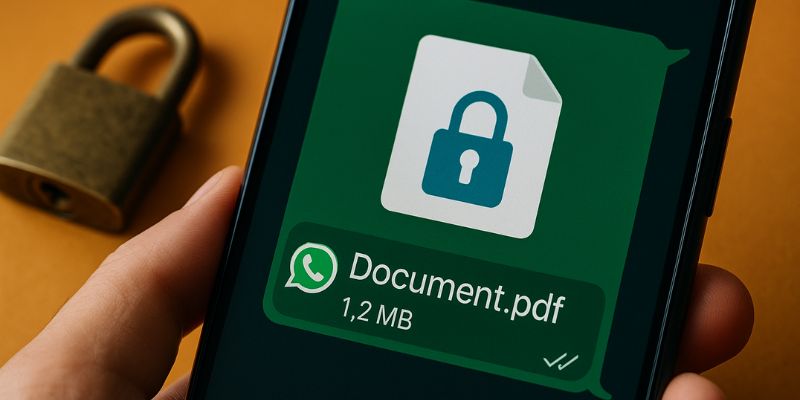Ensure File Security When Sending via WhatsApp
In today’s digital world, sharing files is a routine activity. However, ensuring file security when sending via WhatsApp is crucial to protect sensitive information. WhatsApp is a convenient platform for sharing documents, images, and other files, but it is vital to consider the security measures necessary to prevent unauthorized access. In this article, we will explore comprehensive strategies to enhance file security when using WhatsApp.
Understanding the Importance of File Security on WhatsApp
WhatsApp is an incredibly popular messaging app with over two billion users. While its end-to-end encryption provides a layer of security, it does not guarantee complete protection for the files shared. Cyber threats such as hacking, phishing, and malware attacks are prevalent, which makes file security essential.
Files shared over WhatsApp can contain sensitive information, including personal details, financial data, and confidential business documents. Unauthorized access to these files can lead to identity theft, financial loss, and reputational damage. Therefore, understanding the importance of file security is the first step in safeguarding your data.
How to Enhance File Security When Sending via WhatsApp
- Use Strong Passwords: Always protect your device with a strong password. This acts as the first line of defense against unauthorized access. Avoid using easily guessable passwords like ‘123456’ or ‘password’. Instead, use a combination of letters, numbers, and special characters.
- Enable Two-Factor Authentication: WhatsApp offers two-factor authentication (2FA) as an additional security layer. This feature requires a PIN code when registering your phone number with WhatsApp again. It prevents unauthorized individuals from accessing your account even if they have your SIM card.
- Regularly Update WhatsApp: Keep the WhatsApp application up-to-date to benefit from the latest security patches and features. Developers constantly work on improving the app’s security, and updates often contain crucial fixes.
- Encrypt Files Before Sending: Consider using additional encryption tools to secure files before sending them via WhatsApp. Tools like VeraCrypt or AxCrypt can encrypt documents, adding an extra layer of security.
- Be Wary of Phishing Scams: Phishing attacks are a common tactic used by cybercriminals to steal sensitive information. Always verify the identity of the person you are communicating with and avoid clicking on suspicious links or downloading unknown files.
- Limit File Sharing: Only share files with trusted contacts. Avoid sending sensitive information unless absolutely necessary. When sharing sensitive files, ensure the recipient understands the importance of maintaining file security.
The Role of Encryption in Securing Files on WhatsApp
Encryption is a vital tool in securing files shared over WhatsApp. While WhatsApp provides end-to-end encryption for messages, additional encryption for files can offer an added layer of protection. End-to-end encryption ensures that only the sender and the recipient can read the messages, preventing unauthorized access during transmission.
However, once the files are downloaded, they are stored on the recipient’s device, potentially making them vulnerable to attacks. This is where additional encryption comes into play. By encrypting files before sending, you ensure that only individuals with the decryption key can access the content. This step is crucial for highly sensitive files, such as business contracts or personal identification documents.
What to Do If Your Files Get Compromised
Despite taking precautions, there is always a risk of files being compromised. If you suspect unauthorized access to your files, take immediate action. Change your WhatsApp account password and enable two-factor authentication if it’s not already activated. Additionally, inform the relevant parties about the breach and take steps to mitigate any potential damage.
It is also advisable to conduct a security audit of your device to detect and eliminate any malware or spyware that might have facilitated the breach. Regular security audits can help in identifying vulnerabilities and reinforcing your device’s security.
Conclusion
Ensuring file security when sending via WhatsApp is paramount in today’s digital landscape. By implementing strong passwords, enabling two-factor authentication, and using encryption tools, you can significantly reduce the risk of unauthorized access to your files. Stay vigilant against phishing scams and regularly update your applications to benefit from the latest security features. By taking these proactive steps, you can safely share files on WhatsApp and protect your sensitive information.
Frequently Asked Questions (FAQ)
What is the best way to secure files on WhatsApp?
Using strong passwords, enabling two-factor authentication, and encrypting files before sending are effective methods to secure files on WhatsApp.
Can WhatsApp messages and files be intercepted?
While WhatsApp messages are end-to-end encrypted, no system is entirely foolproof. Additional file encryption can provide extra security for sensitive data.
Is it necessary to update WhatsApp regularly?
Yes, regular updates are crucial as they contain security patches and improvements that protect your data from emerging threats.
How can I recognize a phishing attempt on WhatsApp?
Look for suspicious links, unsolicited messages, or requests for personal information. Always verify the sender’s identity before sharing sensitive data.
What should I do if I suspect my files have been compromised?
Immediately change your password, enable two-factor authentication, and conduct a security audit of your device to identify and remove any potential threats.
